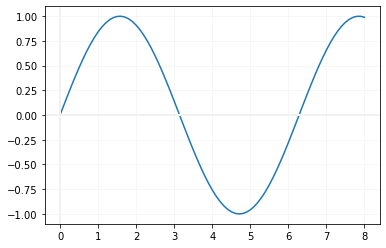sin()
import math
print(math.sin(1)) # 0.8414709848078965
print(math.sin(0.56)) # 0.5311861979208834
print(math.sin(-0.56)) # -0.5311861979208834
print(math.sin(-1)) # -0.8414709848078965
print(math.sin(0)) # 0.0
print(math.sin(math.pi)) # 1.2246467991473532e-16Inputs in degree
We can convert radian value to degree and use the sameimport math
in_degree = 90
in_redian = math.radians(in_degree)
print(math.sin(in_redian)) # 1.0 1 radian = 57.2957914331 degree
1 degree = 0.0174533 radian
1 degree = 0.0174533 radian
Drawing graph of sin()
Using this we will use Matplotlib to generate graph of sin
import matplotlib.pyplot as plt
x=[]
y=[]
i=0
while (i<=8):
x.append(i)
y.append(math.sin(i))
i=i+0.1
plt.plot(x,y)
plt.axvline(x=0.00,linewidth=2, color='#f1f1f1')
plt.axhline(y=0.00,linewidth=2, color='#f1f1f1')
plt.grid(linestyle='-', linewidth=0.5,color='#f1f1f1')
plt.show()Drawing sin and cos curves on Tkinter Canvas
Subscribe to our YouTube Channel here
This article is written by plus2net.com team.
https://www.plus2net.com

 Python Video Tutorials
Python Video Tutorials